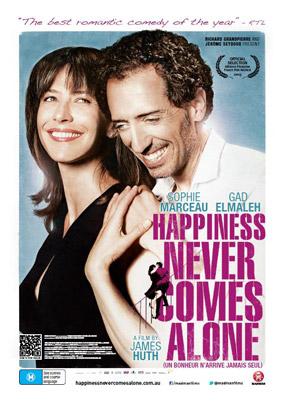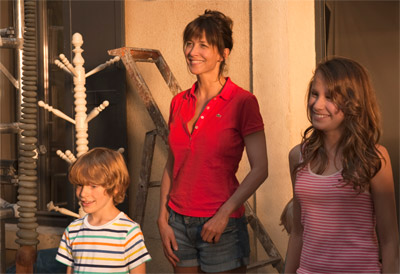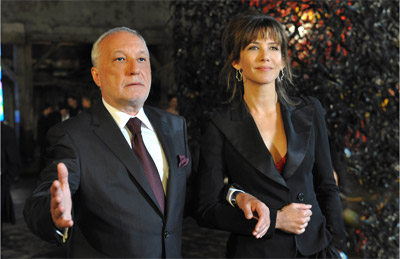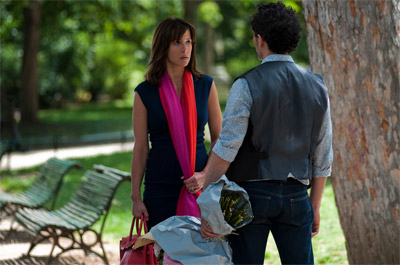James Huth Happiness Never Comes Alone Interview

James Huth Happiness Never Comes Alone Interview
Cast: Sophie Marceau, Gad Elmaleh
Director: James Huth
Genre: Comedy, Romance
Rated: M
Running Time: 105 minutes
Synopsis: Sacha likes his friends, his piano and partying. He spends his evenings playing in a jazz club where he seduces pretty girls. He is happy and free as the wind, living the thrill of the moment. No alarm clock, no wedding ring, no taxes.
Charlotte has three children, two ex-husbands and a career to manage. She doesn't have any space for romance in her life.
They are poles apart and have nothing in common...
But they are made for one another.
Happiness Never Comes Alone
Release Date: May 30th, 2013
Interview with James Huth
Question: After trying various comedy genres, why did you decide to make a romantic comedy?
James Huth: I've dreamt about it for a long time, and my wife – with whom I wrote the screenplay – has dreamt about it for even longer. It's no doubt a desire to make a very optimistic film about love.
Question: Are there codes that must be respected when you write a romantic comedy?
James Huth: Yes, but fortunately, you can play around with that. Usually, the couple take the whole film to get together and fall in love, but we wanted the characters to fall in love right away. Two people meet and it overwhelms them. It just has to be, because it's her, because it's him. But the romantic comedy element remains, and the question becomes: how are they going to make this love work because they are total opposites? You know they're going to end up together. I grew up with the movies of Capra and Cukor, which tell you that life is wonderful and there's good in everyone.
Happiness Never Comes Alone is very much a feel-good movie. That was our aim so I hope we achieved it. Everything is always possible. A woman can find a man who loves her with her three kids. Not all men are cowards who run away at the first obstacle.
 Question: How did the writing process go with your wife, Sonja Shillito?
Question: How did the writing process go with your wife, Sonja Shillito?
James Huth: Our starting point was the obviousness of the love affair and the fact that a single man meets a woman with children. This is something that we had experienced first hand. Then we moved into the realm of fiction to create a romantic comedy. And we took a lot of pleasure writing the film, which is rare.
Question: Is it easier writing as a couple?
James Huth: It's hell! Writing is the most difficult thing. We met through writing and we got married because we spent our time writing together. We come from different cultures and have opposite sensibilities, so when we're both happy about a scene, we know someone else might like it. I am mathematical and Slavic, she is literary and Anglo-Saxon.
Question: When you're prepping a film based on a couple, do you write with the actors in mind?
James Huth: Certainly not. You just want to write the best possible script, then pray to find the actors that allow us to take the project to another level. The romantic comedies that I love are those in which there is a sort of grace beyond the script, that magic that sometimes occurs between actors. Those are the films that last. Katherine Hepburn and Spencer Tracy could do anything, the grace was always there.
Question: What are your top five romantic comedies?
James Huth: Up Close and Personal, Mr Deeds Goes To Town, The Shop Around The Corner, Notting Hill and all the films starring Hepburn and Tracy. But my favourite films all have idealistic love stories: Limelight, A Place In The Sun, Spartacus, The Red Shoes, The Cranes Are Flying and The Fountainhead.
Question: Bringing together on screen France's favourite actress and comedian would be a dream for many directors and producers. How did you do it?
James Huth: We began with the female character. We needed an actress who could have that humanity, who could be the mother of a family, be glamorous, and have some real potential for slapstick comedy. We dreamed of having Sophie Marceau. I contacted her through her agent, I explained the project, and five days later I met with her. I still can't quite believe it. I've always dreamt of making a film with her. When I met her, we talked about the script and she asked me who I had in mind for the male lead. Then Sonja woke up with a start at five in the morning and had the idea of Gad. We were looking for someone who could be at once unexpected and obvious. They don't belong together, yet they're made for each other.
Question: Did you immediately offer the script to Gad?
James Huth: In fact, we'd written a pianist role without knowing that Gad plays piano. When I sent him the script, he was filming in the US with Adam Sandler and Al Pacino. He called me back quite quickly to say he'd do the film. He confessed he'd always dreamt of working with Sophie Marceau. I loved him as soon as I met him. He can do anything and the Sacha character allowed us to show off the complete artist that he is. On set, nothing is impossible for him. He uses his good nature as a way of concentrating, and it's one long show.
 Question: How did you approach working with Sophie Marceau?
Question: How did you approach working with Sophie Marceau?
James Huth: She's an American star combined with a very nice person. She shows professionalism, commitment and concentration, whatever's thrown at her. She puts everything into it from the first to the last second. For all the scenes in the icy rain, or when she falls to the ground, she did it all herself. She didn't have a stand-in once in the whole film. It was a real delight. What's more, she's a very upbeat person who likes a laugh, so I think she found the slapstick fun, too. The icing on the cake is that she gets more beautiful with age.
Question: Was the complicity between Sophie and Gad there from the start?
James Huth: I first spent some time with each of them separately. I had thought about the moment when they'd meet, but it didn't happen as planned. One day when I was working with Sophie in the bar of a big hotel, Gad came and sat in my line of sight, his back to her, without having seen us. So I asked Sophie to turn round. Gad felt her gaze. They'd never met before, but it was wonderful how it happened so naturally. The same can be said for their relationship after that.
Question: How would you describe Sacha's character?
James Huth: Ever since his father died when he was 10, he's taken each day as it comes. He lives from one day to the next, he's not interested in the humdrum. He's a man who women pamper, starting with his mother and his grandmother. What's more, Macha Méril is fabulous in this role, she gives it some genuine humanity and avoids any caricature.
Question: You didn't opt for a Jewish mother, but a Jewish grandmother. Why?
James Huth: The grandmother is based on my own. Moreover, the woman who plays the grandmother is my great aunt, who's 94. I was looking for an actress who could do a Hungarian accent and deliver a line like: 'Don't oblige me to take a train leaving for the east," but I couldn't find one. This phrase had to be said convincingly. The character is 100% authentic.
Question: Let's talk about Charlotte. Who is she?
James Huth: She's an idealist who believed in love with all her relationships. She was wrong twice, no doubt because she rushed into it. Fascinated by the intelligence of her second husband Alain Posche, she didn't notice she was shutting herself into a gilded prison. In the course of the film, she says, 'I'm not allowed to take anyone back to my place, that's the deal." In fact, she becomes aware of the implications of this as she says it.
Question: She also says: 'We were a free couple; I was a couple, he was free."
James Huth: She never thought her husband could cheat on her. She left him when she found out. Now, she hasn't got room for any mistakes, she wants to protect her children. And above all, she's not ready to have a relationship. In fact, Sacha and Charlotte are two people who are on the path to be free and to become themselves. Each of them separately, and also thanks to the other. That's love too – self-fulfilment and becoming your true self thanks to someone else.
Question: The script is very precise, but one gets the impression Gad had to improvise some scenes, notably the one in which he has to put the child to bed.
James Huth: There's very little improv in the film. I had crafted a very precise scene that I could have asked any actor to play. And there, the Harold Lloyd or Chaplin side of Gad came into play. It was up to me to make the most of it. He was magnificent.
Question: Sophie appears undressed, Gad shows his backside – that can't have been easy for them.
James Huth: I was lucky that they are both such modest people. Each of them understood the effort involved for the other. They helped each other and we had a lot of fun. But I have to say that in the scene when Sophie's undressed, something happened on the first take. It was magical, the whole crew was speechless. That's what you see on screen. She was fragile and awkward, but it was a real sign of trust on her part. I can never thank her enough for having the generosity to go to such limits. It was natural and laid back. It captures the spirit of the film.
Question: What about the dance scene?
James Huth: That scene would only work if I managed to get Sophie and Gad to dance without anything artificial. I wanted to catch them on film, free and spontaneous. During our preparation meetings, I had them work on an improv on the theme of dance. Then I told them I'd inserted a line in the script: 'He asks her to dance." Gad immediately asked to what music, and I didn't tell him until the shoot. On the given day, at the moment the song's about to come on, Gad winked at me and asked: 'Is it the music from The Party?"
Question: Sacha can't live without his friends and his music. What's more, he has a project for a show which he holds dear, and Maurice Barthélemy's character asks him to make a crucial choice.
James Huth: Maurice's character is the opposite of Gad's. He dreams of meeting a woman and getting married, unlike Sacha. The two of them have a childhood dream which could finally be fulfilled just when Sacha meets Charlotte, hence the conflict. Maurice has an incredible gift for comedy. He's brilliant in every single take, and he's as convincing in the comedy as in the emotion.
Question: François Berléand once again has quite a juicy role as baddie.
James Huth: He represents power and arrogance, and at the same time, you understand that he loves Charlotte and her sons deeply. It took the genius of François Berléand to translate all the complexity and humanity of a character in one line, during the final confrontation with Gad.
Question: Through the character of her sister, played by Valérie Crouzet, we get a better understanding of where Charlotte comes from…
James Huth: Through the sister, who's down to earth and anchored in real life, we realize that Charlotte wasn't born with a silver spoon in her mouth. I saw Valérie in the play 'Moins Deux", in which she acted with Jean-Louis Trintignant and Roger Dumas. She was really fantastic and I remembered that. Michaël Abiteboul, who plays the third buddy, has also acted a great deal on stage. He has a real deft touch and the perfect profile of the best friend in Anglo- Saxon comedies.
Question: This film is the first time you have directed children. What was your approach?
James Huth: That's one of the reasons why I didn't make this film earlier – I didn't feel ready to direct children. How can you be demanding of children, while at the same time protecting them? It was essential that it all remained a game, and not a job of work. Elsa Pharaon, the casting director for the children, found us three amazing kids.
Question: In the film, we recognize your touch with the whole burlesque side of situations: Sophie Marceau's falls, the bathroom blowing up, and so on.
James Huth: The more beautiful a woman is, the more violent the fall – it's funnier. Slapstick has always been part of who I am. Sonja and I both liked the idea of a mother crashing about, covered in bruises. What's more, Sophie confessed to us that she is a bit like her character in that respect.
Question: The sets are quite luxurious. From Charlotte's apartment to Posche's office and Sacha's loft, it's all very chic.
James Huth: It's a universal story, but I wanted the film to be glamorous. Reconstructing that fabulous apartment overlooking the Parc Monceau and the artist's studio under the roofs of Montmartre gives the film the feel of the American comedies of the 1950s, like those of Billy Wilder. Montmartre, jazz – I often think of the film as a modern version of The Aristocrats. It's O'Malley meeting the Duchess and her three kittens. In fact there are several references to The Aristocrats in the film.
Question: Another movie that serves as a reference is Casablanca.
James Huth: When I met Sonja, we couldn't go into a place without the music from Casablanca playing. That film means a lot to us, we even have the poster over our bed. We needed a visual element to express that they're made for each other, despite their differences.
Question: Part of the story takes place in New York. Was it a dream to shoot in the city?
James Huth: In the script, that scene took place in Canada. Our producer Richard Grandpierre, who really believed in the film, told us two things during our first meeting: we have to do the first scene in the rain; and they shouldn't go to Montreal, but New York. He was right. The New York sequence comes just after their separation. For Sacha, it's the end of the world – he's lost that woman. I needed something to suggest a sea-change. Hence those spinning buildings.
Question: Why did you give the role of stage producer to Robert Charlebois?
James Huth: We wrote it as a theater in Canada with a truculent show producer, and after moving the scene to New York, we thought a Canadian could be running a theater on Broadway, and that way we could keep the dialogue in French. We were looking for a Canadian in his sixties who's warm and charismatic, and I thought of him. Robert Charlebois embodies Canada all on his own.
 Question: How did you go about the musical choices?
Question: How did you go about the musical choices?
James Huth: From Billie Holiday to Stevie Wonder, the soundtrack has a wealth of pre- existing songs. Nothing can replace the memories evoked by a song you grew up with. Bruno Coulais, who I have worked with since my first film, wrote the original music. Pierre-Yves Plat, a pianist with abundant inventiveness who writes his own shows, arranged the pieces that Gad plays. The song in Sacha's stage show was composed by Marc Chouarain.
Question: What will you take away from this adventure?
James Huth: That it lived up to its title. I worked with my regular partners – Stéphane Le Parc for the lighting, set designer Pierre Quefféléan, Olivier Bériot for the costumes, Alain Féat and Nicolas Dambroise on sound and many others. But this film was my first adventure with some outstanding technicians like editor Joëlle Hache. It was also a marvelous first collaboration with producer Richard Grandpierre and our friends at Pathé. And above all, with Sophie and Gad, who I was lucky enough to bring together on screen. They all showed me every day that Happiness Never Comes Alone.
MORE
- Mission: Impossible Fallout
- Glenn Close The Wife
- Allison Chhorn Stanley's Mouth Interview
- Benicio Del Toro Sicario: Day of the Soldado
- Dame Judi Dench Tea With The Dames
- Sandra Bullock Ocean's 8
- Chris Pratt Jurassic World: Fallen Kingdom
- Claudia Sangiorgi Dalimore and Michelle Grace...
- Rachel McAdams Disobedience Interview
- Sebastián Lelio and Alessandro Nivola...
- Perri Cummings Trench Interview



